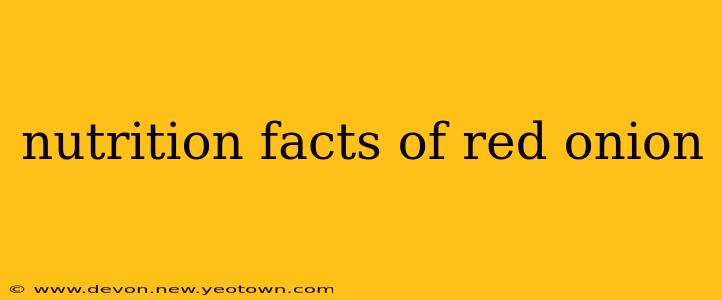The humble red onion, a staple in kitchens worldwide, is more than just a pungent addition to salads and savory dishes. This vibrant bulb packs a surprising nutritional punch, offering a wealth of vitamins, minerals, and antioxidants that contribute to overall health and well-being. Let's peel back the layers and explore the fascinating nutritional profile of this culinary gem.
What are the key nutritional benefits of red onions?
Red onions are low in calories but rich in essential nutrients. They're an excellent source of vitamin C, a potent antioxidant crucial for immune function and collagen production. They also boast a decent amount of vitamin B6, vital for brain development and function, and folate, essential for cell growth and development, especially crucial during pregnancy. Furthermore, red onions are a good source of dietary fiber, aiding digestion and promoting gut health. The vibrant color hints at their richness in anthocyanins, powerful antioxidants linked to a reduced risk of chronic diseases.
How many calories are in a red onion?
A medium-sized red onion (about 100 grams) contains approximately 40 calories. This low-calorie profile makes it a perfect addition to any diet aiming for weight management or overall health improvement. Remember, calorie counts can vary slightly depending on the size and variety of the onion.
What vitamins and minerals are found in red onions?
Beyond the vitamins already mentioned (C and B6, and folate), red onions also contain smaller amounts of other essential vitamins and minerals, including:
- Potassium: Crucial for maintaining healthy blood pressure.
- Manganese: Important for bone health and metabolism.
- Copper: Plays a role in energy production and iron absorption.
This diverse array of nutrients makes the red onion a valuable contributor to a balanced and healthy diet.
Are red onions good for your health?
The answer is a resounding yes! The combination of vitamins, minerals, and antioxidants in red onions contributes to various health benefits:
- Immune system support: The high vitamin C content boosts immunity, helping your body fight off infections.
- Improved heart health: The antioxidants, particularly anthocyanins, may help lower cholesterol and blood pressure, reducing the risk of heart disease.
- Cancer prevention: Studies suggest that the compounds in red onions may have protective effects against certain cancers.
- Blood sugar control: Some research indicates that red onions may help regulate blood sugar levels.
- Enhanced digestion: The fiber content promotes healthy digestion and prevents constipation.
What are the potential downsides of eating red onions?
While generally safe and healthy, some individuals may experience mild side effects after consuming red onions. These include:
- Heartburn or indigestion: The high acid content can trigger heartburn in susceptible individuals.
- Allergic reactions: Although rare, some people are allergic to onions, experiencing symptoms like skin rashes or breathing difficulties.
- Bad breath: The sulfur compounds in onions are responsible for the characteristic pungent odor, which can linger on the breath.
In summary, red onions are a nutrient-dense powerhouse offering a wide range of health benefits. Their low calorie count and high concentration of vitamins, minerals, and antioxidants make them a valuable addition to a healthy diet. While potential downsides exist, they are generally mild and affect only a small percentage of the population. So, the next time you’re preparing a meal, don't underestimate the power of this versatile and nutritious vegetable!

